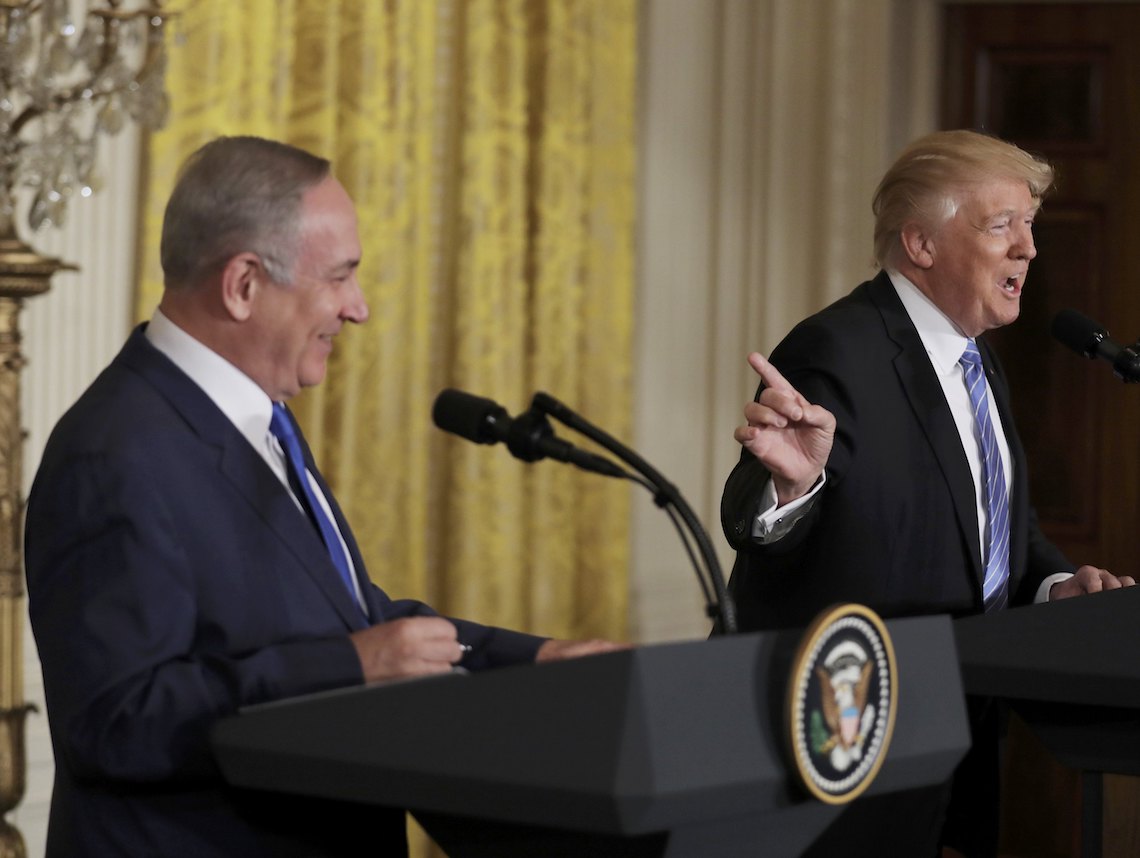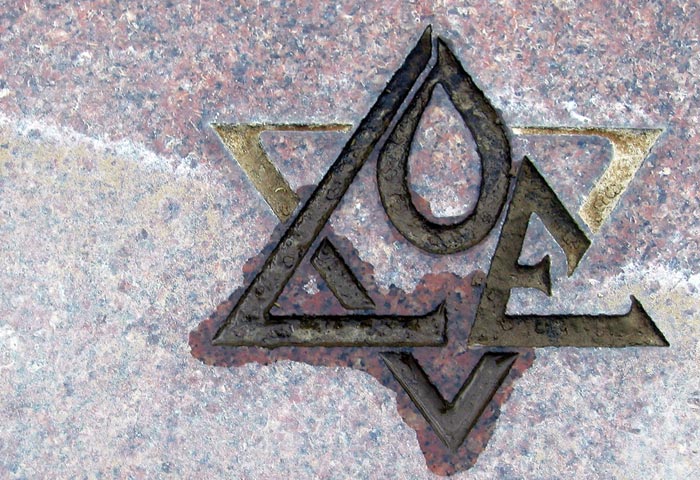 President Donald Trump (R) laughs with Israeli Prime Minister Benjamin Netanyahu at a joint news conference at the White House in Washington, U.S., February 15, 2017. REUTERS/Carlos Barria
President Donald Trump (R) laughs with Israeli Prime Minister Benjamin Netanyahu at a joint news conference at the White House in Washington, U.S., February 15, 2017. REUTERS/Carlos Barria 1.
People supportive of the two-state solution tend to forget that there is nothing sacred about it. It is – as its title hints – a “solution.” That is: a means to an end.
What is the end? Having Israelis and Palestinians live peacefully where they both feel at home. Or more accurately: for Israel it is having Israelis live peacefully where they feel at home. For Palestinians it is having Palestinians live peacefully where they feel at home. What is the end game for America? Having the Israeli-Palestinian conflict solved in a way that puts this distraction to rest.
It is important to remember that Israel has no interest in having a Palestinian State. Israel’s interest is to have a secure, thriving, culturally cohesive Jewish state. A Palestinian state is only a way for some Israelis to achieve this goal. But if a Palestinian state is not the best way for Israel to achieve this goal, Israel would abandon the two-state solution without much fanfare.
It is also important to remember that the US has no interest in having a Palestinian state. America’s interest is to get the “conflict” off the table as much as that is possible. If a Palestinian state is not the best way for the US to achieve this goal, then it would abandon the two-state solution without much fanfare.
This is essentially what President Donald Trump said yesterday. One state, two states, why would he care? If the two sides are happy with another solution, there’s no reason for the US to stick to the two-state solution as if this were some kind of sacred theology. There is no reason for anyone to complain about Trump’s refusal to stick to a certain solution. In fact, all supporters of peace ought to be delighted with Trump’s recognition of the fact that the two-state solution mantra turned this idea from a solution to a goal – it made it an obstacle.
2.
Killing the two-state solution as the only idea on the table is easy. Finding the alternative is tough. It is especially tough if one has in mind the goal that Trump has in mind:
I’m looking at two-state and one-state, and I like the one that both parties like. I’m very happy with the one that both parties like. I can live with either one.
The one that both parties like. That is the tough part. You can have a two-state solution that some people could like. You can have a one-state solution that some people could like. But having a solution that both parties like seems unachievable at the moment. Thus, what Trump was proposing yesterday is meaningless. If he is interested at brokering peace between Israel and its Arab neighbors as he says, the road ahead is clear up to a point: he will see what the parties say they want. He then will realize that there is no such thing as “the one that both parties like.” He will then have to reconsider his position.
He could decide: This is not for me – I am not ready to push these two peoples into something both of them do not want.
He could decide: I have to come up with a certain solution that I think is best for the two sides – because they will never be able to agree on anything on their own.
What will Trump choose to do? There was nothing in his performance yesterday that clarifies that. It depends on many variables, most of which concern matters that have nothing to do with Israel or Palestine. They have to do with Trump’s overall agenda, and the energy he will want to spare for dealing with the elusive Middle East peace.
3.
This morning I heard the leaders of the Israeli right getting used to the idea that Israel is going to restrain the construction of settlements in the West Bank. They are getting used to it without much protest. They are getting used to it without realizing that they got very little in return for a partial freeze. Trump should thank his predecessor, President Obama, for making things so easy for him with the Israeli right. The bar, following Obama, was set so low, that even a president who unceremoniously asks for a partial freeze of settlements is accepted with glee.
4.
Jewish critics of Israel’s policy – who are also Jewish critics of the new US president – please do not get confused: It is good for Israel to get along with the American president. It is good for Israel to have warm relations with the White House and to be able to coordinate its policies with a sympathetic administration. As you saw during the eight years of contentious relations between Israel and the Obama administration – such relations do not make Israel safer and do not make peace more possible. So maybe cutting Trump and Netanyahu some slack and letting them try a different approach would be wise.
And by the way:
Maybe it is time to stop the unhelpful (and politicized) hysteria concerning the US and Israel: Gallup just released its numbers, and they show that support for Israel in the US is as strong as ever.
Maybe it is time to stop the unhelpful (and politicized) hysteria concerning the US and anti-Semitism: PEW just released its numbers, and they show that Jews in America are still very well liked.
5.
A few words about the appointment of David Friedman as ambassador to Israel:
1. An ambassador should reflect and communicate the policy of a certain administration. Expecting Trump to appoint an ambassador in line with Obama’s approach is unrealistic and unwise. That would make the ambassador ineffective.
2. An ambassador does not make or break US policy. Friedman is not going to make peace more or less likely.
3. In fact, Friedman could be effective in a way similar to Trump in his performance yesterday: Israelis will trust his good intentions and hence will be more receptive if and when he voices certain criticism or makes certain demands on behalf of the administration.
4. I hear that a few former ambassadors argue that Friedman is “unqualified” to be ambassador because he has “extreme, radical positions.” But one ought to ask: radical compared to whom? Many Israelis would consider the views of some of these former ambassadors – Dan Kurtzer is a prime example – as much more radical than Friedman’s. In fact, a fair number of Americans – many of which are “tepid” (Gallup’s definition) on Palestinian statehood might find these ambassadors’ views more radical than Friedman’s.
5. The fight over Friedman sounds much like the fight over Trump: Those who do not accept the reality of Trump also do not want to accept the reality of Friedman. In other words: this is not about Friedman’s qualifications, it is about the boss’ qualifications. And it is misguided: Because no ambassador – not even the one most acceptable to J Street, or to the five former ambassadors, or to Haaretz Daily – is going to save America and Israel from Trump.























 More news and opinions than at a Shabbat dinner, right in your inbox.
More news and opinions than at a Shabbat dinner, right in your inbox.